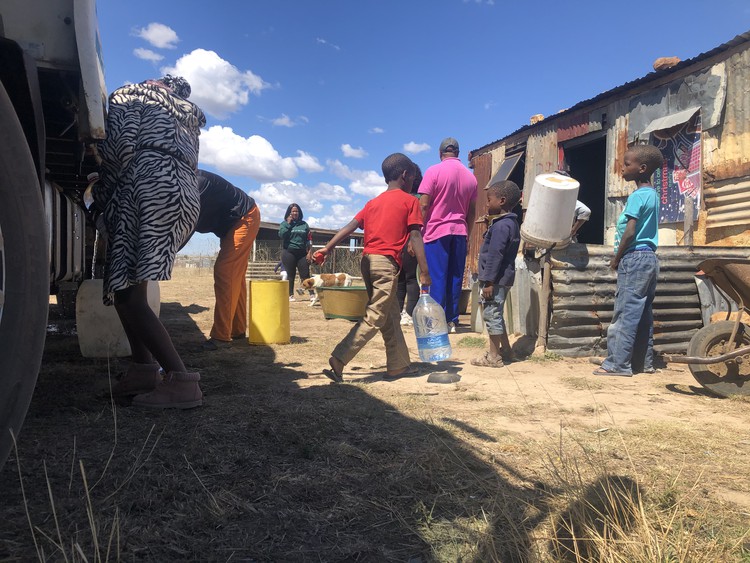Taps run dry as water crisis deepens in Makhanda
“The recent rains haven’t had the desired impact on our dams” says municipality
Residents of Nkanini town in Makhanda collect water from a Gift of the Givers water tanker in October 2020. Archive photo: Lucas Nowicki
- Water has become so scarce in Makhanda that the municipality is shutting water off every second day.
- But residents say there has been no tap water for days and even weeks in some areas.
- The water in Settlers Dam is being eked out until the the city system can be reconfigured to use water from the Glen Melville Dam.
The Makhanda water situation is “critical” according to the Makana Municipality. Water rations are at 50 litres per person per day. Water is now shut off every second day to allow sufficient time to refill the reservoirs.
But in some areas taps are dry for days at a time, even weeks according to residents. High-lying areas are failing to get supply. In some locations residents are forced to buy water from people who have vehicles and donkey carts to fetch it. Children are not going to school because there is no water to bath in or water to wash their school uniforms.
“The recent rains haven’t had the desired impact on our dams, hence water is shut-off every second day,” said spokesperson Anele Mjekula.
The current plan is to eke out the supply for as long as possible while the system is reconfigured so that the city network can get water from the James Kleynhans Water Treatment Works supplied by the Glen Melville Dam. It currently gets it from the Waainek Treatment Water Works, supplied by the Settlers and Howisons Poort dams.
When Settlers Dam runs dry, there will only be a manual distribution of water at collection points for Makhanda residents.
Kwenzekile Mphati says where he lives in Vukani location it is the third week they have been without tap water. People with vehicles and donkeys fetch water from other locations and sell five litres for R20 and 20 litres for R60.
Nokulunga Chrisjan, who lives in Fletcher Street, Makhanda, said they haven’t had water since last Tuesday. “I don’t even know what we vote for … We will live like this until Jesus comes back,” she said.
Xolela Nobebe, who lives in Polar Park, said they have been almost a week without water. “We don’t have water at all here. We are going to work wearing dirty clothes,” he said.
Nobebe said people are now fetching water from Extension 2 in Joza.
Nomawethu Bonani, from Eluxolweni location, said their section has not had water for two weeks. She goes to town to buy five litres of water for R15.
But municipal spokesperson Yoliswa Ramokolo said the municipality was “not aware” of these long water outages. “It has not been reported to the municipality. The community is encouraged to report to the municipality when they did not receive water on an ‘on day’, so that the problem can be investigated,” said Ramokolo.
Ramokolo said, “This will come to an end once we get adequate rainfall that will fill up both dams [Settler’s and Howinson Poort] or when the upgrading of James Kleynhans Treatment Works has been completed.”
Ayanda Kota, leader of the Unemployed People’s Movement (UPM), placed the blame squarely on the ANC. “It’s simple – the ANC has failed the people of the city.”
For a diagram explaining Makhanda’s water reticulation system see here.
Support independent journalism
Donate using Payfast

Don't miss out on the latest news
We respect your privacy, and promise we won't spam you.
Next: PRASA blames Covid-19 and vandalism for collapsing East London train service
Previous: Cape Town’s emergency housing programme is unconstitutional, says court
© 2021 GroundUp. This article is licensed under a Creative Commons Attribution-NoDerivatives 4.0 International License.
You may republish this article, so long as you credit the authors and GroundUp, and do not change the text. Please include a link back to the original article.
We put an invisible pixel in the article so that we can count traffic to republishers. All analytics tools are solely on our servers. We do not give our logs to any third party. Logs are deleted after two weeks. We do not use any IP address identifying information except to count regional traffic. We are solely interested in counting hits, not tracking users. If you republish, please do not delete the invisible pixel.

